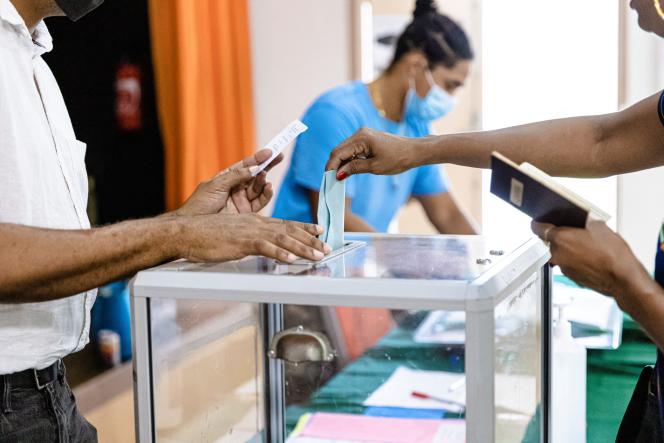
The first round of voting abroad and abroad for the first round of the presidential election began on Saturday, April 9, while the city will have to wait until Sunday to decide the twelve candidates for a referendum that will appear tight.
Little is known about this eleventh presidential election by universal suffragee Republic: Non-voting rate. Many political scientists fear that April 21, 2002 (28.4%) will break the record, the highest ever recorded in the first round of the presidential election. In 2017, this was not a good old age already, and this rate rose to 22.2% in 2017. The new feature, the highly undecided voters, creates uncertainty “Not trivial” According to political scientist Pascal Perino, on the ballot.
Public meetings, distribution of leaflets and digital campaigning have been banned as the results are pending from 8pm on Sunday. Polls will open at 8 a.m. Sunday in the mainland of France, and no interview, poll or assessment will be released before the results.
Two candidates, Europe Ecologie-Les Verts, Yannick Jadot, and La France insoumise, Jean-Luc Mélenchon, however, went to a rally in Paris on Saturday for climate and social justice.
Suffrage denied in Shanghai
Considering the time difference, some foreign voters are voting on Saturday. Saint-Pierre-et-Miquelon rolled the ball at 8am (noon in Paris), followed by Guyana, Martinique, Guadeloupe, Saint-Martin and Saint-Barthelemy.
The Pacific then takes power, with Polynesia beginning to vote at 8pm in Paris, Wallis and Futuna and New Caledonia. In Polynesia, the turnout was 12.34% at noon, up from 22.24% in the same period in 2017, according to the High Commission.
In the Indian Ocean, where the time difference is short, Reunion will vote Sunday at 6 a.m. from Paris and Mayotte at 7 p.m. Some French people living abroad are also in the front, but Shanghai residents cannot vote, as China’s largest city is restricted in the name of China’s zero Govt strategy.
“Island of Debates”
“We have experienced a bizarre campaign that contradicts all imagination of the presidential election.”, Explains Frédéric Dabi, Director of IFOP. A campaign “Unpublished” For several reasons: The war in Ukraine “anesthesia drug”A “Low interest” This contradicts previous elections, and is non-existent “Regular Conflict of Plans” Between competing candidates.
“We have a kind of archipelago of discussions with little quarrels”, Especially between the far-right Eric Gemmor (Reconquête!) And the right-wing candidate Valérie Pécresse (Les Républicains) or the “rebel” Jean-Luc Mன்சlenchon and a fragmented left-wing candidate, Ecologist Yannick Jodot, Communist Fossilist Paudo and Natalie Orthod. Sovereign Nicholas DuPont-Aiken and Bernouss Vice President Jean LaSalle regretted campaigning without debate.
A “eroded” Republican lead
Candidates multiplied in the last week of the campaign to avoid indecision and abstention: last important meetings, media revelations, final field trips.
The outgoing president, always at the top of the ballot, entered the campaign late, first prevented by a health crisis, and then by the invasion of Ukraine by Russia. He focused on a large national gathering on Saturday, April 2 in La Defense, but was inspired by several interviews over the weekend, pre-visiting a market in Newelli on Friday, April 8th.
The National Rally candidate, Marine Le Pen, made his last trip to Aude on Friday, building up an upward pace after being disturbed by his far-right rival Eric Gemmer, confirming second place and then gradually tightening the gap with Emmanuel. Macron. Jean-Luc Mélenchon gradually climbed to third. Political scientists, however, do not rule out the possibility that this trifecta, provided by opinion polls, may come as a surprise.
Even before the end of the first round, several candidates presented themselves in the perspective of the Macron-Le Pen fight in the second round, revealing divisions. “Republican Front” Against the far right. “The Republican front is not what it used to be. It has been eroded from top to bottom. ”Gilles Finchelstein, director of the Jean Jaurès Foundation, explained to Agence France-Presse. “It’s a spring”But think of it this spring “Enough is an illusion”.

“Proud explorer. Freelance social media expert. Problem solver. Gamer. Extreme travel aficionado.”

